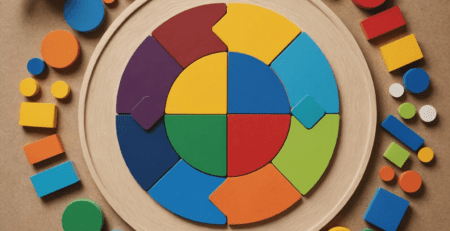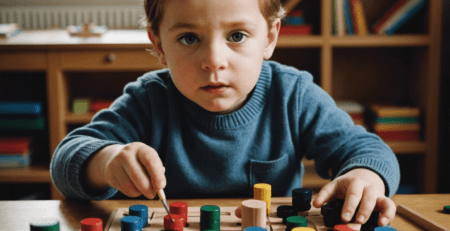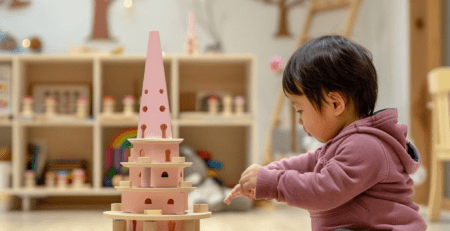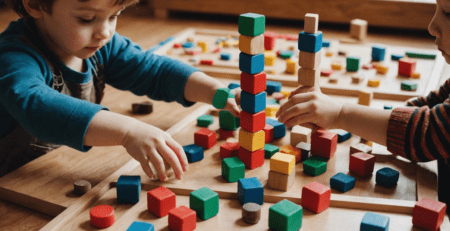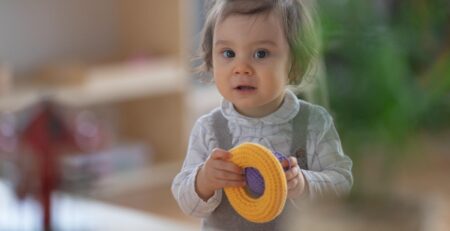
19
Discover the Best Montessori Toys for Early Childhood Development
Welcome to the world of Montessori toys, where play meets learning in a thoughtful and purposeful way. Designed to engage and stimulate young minds, these toys are more than just objects – they are tools for exploration, discovery, and development. In this article, we will delve into the fascinating world of Montessori toys, exploring their unique characteristics and the ways in which they can benefit children’s cognitive, emotional, and social growth. Whether you are a parent, educator, or simply curious about the Montessori approach, join us as we explore the endless possibilities of these enriching playthings.
Table of Contents
- Benefits of Montessori Toys for Child Development
- Characteristics of Montessori Toys
- Choosing the Right Montessori Toy for Your Child
- How Montessori Toys Support Independent Learning
- Introducing Montessori Toys into Your Child’s Playtime Routine
- Q&A
- Wrapping Up
Benefits of Montessori Toys for Child Development
Montessori toys are designed to promote learning and development in young children through play. These toys are based on the educational philosophy of Maria Montessori, who believed that children learn best through hands-on experiences with carefully crafted materials. Montessori toys are thoughtfully designed to encourage independence, self-motivation, and a love for learning, making them a valuable addition to any child’s toy collection.
Here are some of the benefits:
- Encourages independent play and exploration
- Promotes sensory and motor skill development
- Fosters creativity and imagination
- Helps develop concentration and problem-solving skills
- Supports the development of language and communication skills
| Benefit | Description |
| Encourages independent play and exploration | Montessori toys are designed to be self-correcting, allowing children to learn through trial and error, fostering independence and a sense of achievement. |
| Promotes sensory and motor skill development | Many Montessori toys are designed to engage a child’s senses and encourage the development of fine and gross motor skills through hands-on activities. |
| Fosters creativity and imagination | Montessori toys often have open-ended designs that allow children to use their imagination and creativity during play, promoting innovative thinking. |
| Helps develop concentration and problem-solving skills | The hands-on nature of Montessori toys encourages children to focus on the task at hand and develop critical thinking and problem-solving abilities. |
| Supports the development of language and communication skills | Many Montessori toys involve interaction and collaboration, helping children develop language and communication skills through play. |
Overall, Montessori toys are not only fun for children to play with, but they also provide numerous developmental benefits that can help children learn and grow in a holistic manner.

Characteristics of Montessori Toys
Montessori toys are widely known for their educational and developmental benefits for children. These toys are designed to encourage independent play and help children learn important skills through hands-on activities. Here are some key that make them unique and beneficial for children:
- Natural Materials: Montessori toys are often made from natural materials such as wood, cotton, and metal, which are non-toxic and safe for children to play with. These materials also provide a sensory experience for children, allowing them to explore different textures and develop their fine motor skills.
- Sensory Stimulation: Montessori toys are designed to engage children’s senses, including touch, sight, and sound. These toys often have simple, minimalist designs that allow children to focus on the sensory experience without being overwhelmed by flashy lights or loud noises.
- Open-Ended Play: Montessori toys are open-ended, meaning they can be used in a variety of ways and encourage creativity and imagination. Children are free to explore and play with these toys in their own way, allowing for self-expression and problem-solving skills to develop.
- Focus on Developmental Skills: Montessori toys are carefully curated to help children develop specific skills, such as hand-eye coordination, spatial awareness, and cognitive abilities. These toys are thoughtfully designed to support children’s natural development in a fun and engaging way.
Overall, Montessori toys are designed to promote holistic development in children, offering a balance of education, creativity, and enjoyment. These toys are a valuable addition to any child’s playtime, providing endless opportunities for learning and growth.

Choosing the Right Montessori Toy for Your Child
When it comes to choosing the right Montessori toy for your child, it’s important to consider their age, interests, and developmental stage. Montessori toys are designed to encourage independent play, creativity, and skill development, so it’s crucial to select toys that will provide a stimulating and enriching experience for your little one. Here are some tips to help you choose the perfect Montessori toy for your child:
Consider Your Child’s Age and Developmental Stage: Montessori toys are often categorized by age group, so it’s essential to select a toy that is appropriate for your child’s current developmental stage. For younger children, choose toys that focus on sensory exploration, fine motor skills, and cause-and-effect relationships. For older children, look for toys that encourage problem-solving, creativity, and independent play.
Focus on Open-Ended Toys: Montessori toys are designed to be open-ended, meaning they can be used in a variety of ways and don’t have a specific end goal. Look for toys that allow your child to use their imagination and creativity, such as wooden blocks, stacking toys, or simple puzzles. These types of toys encourage independent play and can be used for years as your child grows and develops new skills.

How Montessori Toys Support Independent Learning
Montessori toys are designed to support the philosophy of Maria Montessori, which emphasizes independence and self-directed learning in children. These toys are carefully crafted to encourage children to explore, discover, and learn at their own pace, promoting independent thinking and problem-solving skills. Here are a few ways Montessori toys support independent learning:
- Sensory Exploration: Montessori toys often include elements that engage a child’s senses, such as textures, colors, and shapes. This encourages children to explore and learn through touch, sight, and sound, promoting independent sensory development.
- Open-Ended Play: Many Montessori toys are open-ended, meaning they can be used in a variety of ways. This allows children to use their creativity and imagination to play independently, fostering the development of divergent thinking and problem-solving skills.
- Self-Correction: Montessori toys are designed to provide immediate feedback, allowing children to self-correct and learn from their mistakes independently. This helps children develop a sense of autonomy and self-confidence in their abilities.
The Impact of Montessori Toys on Child Development
Research has shown that Montessori toys have a positive impact on child development, particularly in promoting independence, creativity, and critical thinking skills. By encouraging children to learn through self-directed exploration and play, Montessori toys support the natural development of a child’s intellect and curiosity, laying a strong foundation for lifelong learning.

Introducing Montessori Toys into Your Child’s Playtime Routine
Montessori toys are educational tools designed to help children develop important skills while they play. These toys are inspired by the Montessori method, which emphasizes the importance of independence, freedom within limits, and a hands-on approach to learning. can have numerous benefits, including fostering creativity, improving problem-solving skills, and promoting a love for learning.
When choosing Montessori toys for your child, it’s essential to select toys that are developmentally appropriate and encourage open-ended play. Look for toys that allow your child to explore, discover, and use their imagination. Some popular Montessori toys include wooden block sets, sensory bins, and sorting games. By incorporating these toys into your child’s playtime routine, you can create a stimulating environment that supports their overall development.
Q&A
Q: What are Montessori toys and how are they different from regular toys?
A: Montessori toys are educational toys inspired by the Montessori method of teaching, which focuses on self-directed activity, hands-on learning, and collaborative play. These toys are designed to encourage independent thinking and problem-solving skills, and are often made from natural and sustainable materials.
Q: What are some examples of Montessori toys?
A: Some examples of Montessori toys include wooden blocks, stacking toys, sorting and matching games, puzzles, and sensory exploration toys. These toys are typically simple in design and promote open-ended play.
Q: Why are Montessori toys recommended for young children?
A: Montessori toys are recommended for young children because they encourage exploration, creativity, and cognitive development. They are designed to foster a love for learning and to help children develop important skills such as concentration, fine motor skills, and social interaction.
Q: What are the benefits of using Montessori toys?
A: The benefits of using Montessori toys include promoting independence, fostering creativity and imagination, developing problem-solving skills, and enhancing fine and gross motor skills. These toys also encourage a love for learning and can help children develop a sense of confidence and self-esteem.
Q: How can parents incorporate Montessori toys into their children’s playtime?
A: Parents can incorporate Montessori toys into their children’s playtime by providing a variety of toys that encourage open-ended play and exploration. They can also create a stimulating and organized play environment that allows children to engage with the toys independently and at their own pace.
Wrapping Up
In conclusion, Montessori toys offer a unique and engaging way for children to learn and explore the world around them. By focusing on hands-on, interactive play, these toys promote independence, creativity, and joy in young minds. Whether it’s a simple wooden puzzle or a sensory play set, Montessori toys are designed to inspire curiosity and growth in every child. So, next time you’re looking for the perfect gift or learning tool for a little one, consider the timeless appeal of Montessori toys. Let the adventure begin!


